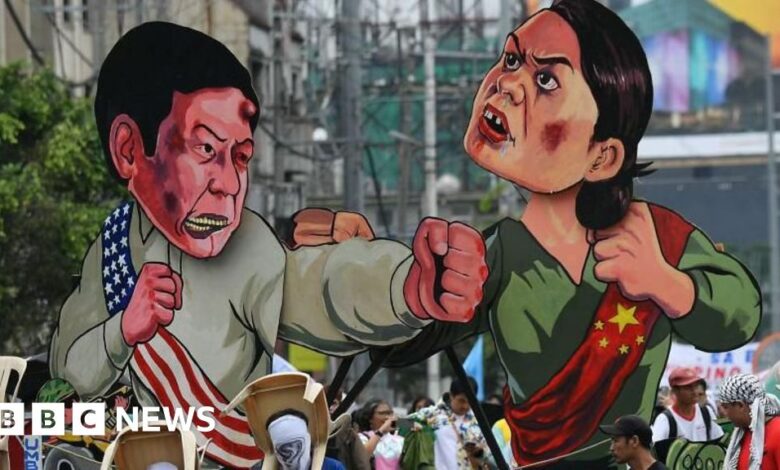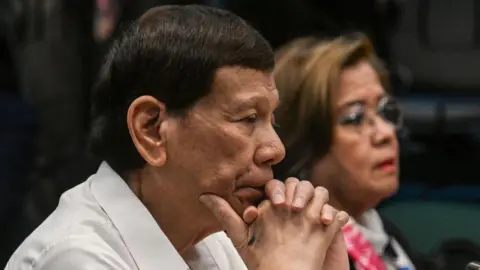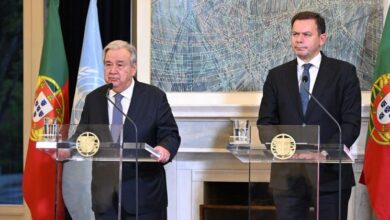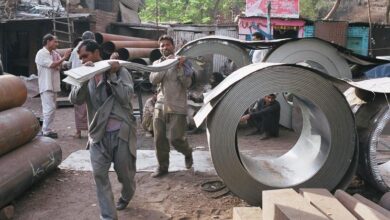The Philippines’ political feud has taken a drastic turn

 Getty Images
Getty ImagesWhen a sitting vice president says she hired an assassin to kill the president and dreams of beheading him, you might think the country is in serious trouble.
But this is the Philippines, where politics and tragedy go hand in hand.
“I talked to someone,” Vice President Sara Duterte said on her Facebook page last weekend. I said, if I get killed, destroy BBM.” [President Marcos], [First Lady] Liza Araneta and [House Speaker] Martin Romualdez. No kidding. No kidding. I said, don’t stop until you kill them, and then he agreed.”
Last month, she told reporters that her relationship with President Marcos had deteriorated and she dreamed of beheading him. She also threatened to dig up the body of the president’s father from the Heroes’ Cemetery in Manila and dump the ashes into the sea.
Behind all this drama is a once-mighty political coalition that has collapsed in spectacular fashion.
A marriage of convenience
The decision of the Marcos and Duterte clans to join forces in the 2022 presidential election is a marriage of convenience. Both candidates are children of presidents – Sara Duterte’s father Rodrigo was the then-incumbent – and enjoy strong support in different parts of the Philippines. Both have populist appeal.
However, both running for president risks dividing their supporters and losing to a third candidate.
So she agreed that Marcos would run for president, while she ran for vice president – two separate elected positions – but they would form a team on the campaign trail. The assumption is that the younger Duterte will be in prime position to run in the next presidential election in 2028.
It proved to be a very effective strategy. UniTeam, as they branded themselves, won resoundingly.
Yet, as any of her predecessors might have told Duterte, the vice presidency is largely ceremonial and carries little power.
The Duterte family wants an influential defense portfolio; Instead, President Marcos gave her an education, an early sign that he was wary of letting his vice president build her power base.
He also abruptly turned his back on the politics of his predecessor.
He ordered the Philippine navy and coast guard to stand up to China in disputed areas in the East Sea. This is in sharp contrast to President Rodrigo Duterte, who has refused to challenge China’s dominant presence there, even declaring that he loves Chinese leader Xi Jinping.
Marcos also toned down President Duterte’s infamous war on drugs, in which thousands of suspected drug traffickers were gunned down.
He has hinted at the possibility of rejoining the International Criminal Court, which issued an indictment for crimes against humanity against Rodrigo Duterte. The former president was also questioned by the Philippine Senate about extrajudicial killings that occurred during his presidency.
Relations between the two factions worsened when Marcos’ allies in the House of Representatives launched an investigation into Sara Duterte’s use of the secret money she was allocated when she took the job.
In July, the vice president resigned as education secretary and her language became increasingly agitated.
Vice President ‘alpha’
Sara Duterte is no stranger to controversy. Thirteen years ago, when she was mayor of Davao City, she was filmed repeatedly punching a court official.
She shares the same political views as her outspoken father, both of whom are known for being tough talkers. He called the Pope “the son of a prostitute” and bragged about killing people.
He describes her as the “alpha” figure of the family who always gets her way; she said he was hard to love. Like her father, she likes to ride big motorbikes.
However, her latest threats against one-time ally President Ferdinand “Bongbong” Marcos may prove to be a reckless statement too far.
Marcos responded by calling Duterte’s comments “reckless” and “troubling.” The Philippine National Bureau of Investigation – America’s equivalent of the FBI – summoned the vice president to explain her threats on Friday.
Now she has taken them back and denies they are real. “This is a plan without flesh,” she explained, accusing Marcos of being a liar who was taking the country to hell.
 Getty Images
Getty ImagesPerhaps it was inevitable that two such powerful families would become rivals in the maelstrom of Philippine politics, which still largely revolves around personalities, extended families and regions.
Political loyalties are flexible; Senators and members of Congress continually change their party allegiances. Power is inevitably concentrated around the president, with the power to distribute government funds. Former presidents are frequently investigated for corruption or abuse of power after leaving office.
President Marcos wants to restore his family’s reputation, after his father was shamefully overthrown in a popular uprising in 1986, and will want to influence the choice of his successor in 2028. The Duterte family has their own dynastic ambitions.
Currently, Sara Duterte is still vice president. She could be impeached by the Senate, but that would be a risky move for President Marcos. She enjoys strong popular support in the South and among millions of Filipino workers abroad, and getting enough support in the Senate for impeachment could be difficult.
Midterm elections will take place next May, in which the entire House of Representatives and half of the 24 senatorial seats will be up for grabs. They will be considered a test of the strength of each rival faction.
Duterte’s explosive split with the president is an opportunity for her to back her candidates and present herself as an alternative to a government that has lost credibility because of the lackluster performance of the economy. That could give her a better launching pad for the 2028 presidential race than being tied to the Marcos administration.
But after her inflammatory comments over the past few weeks, Filipinos must be wondering: what will she say next?





